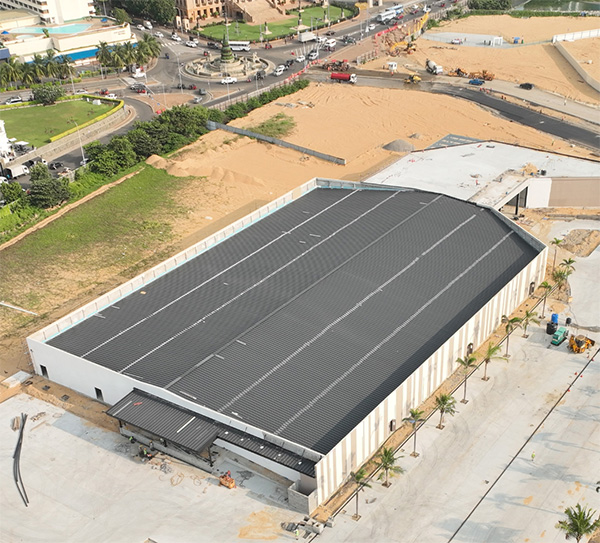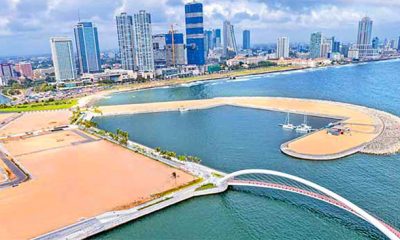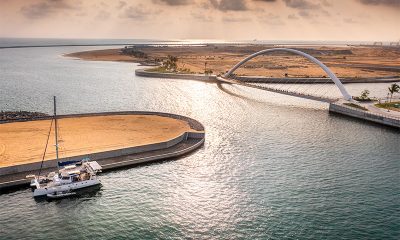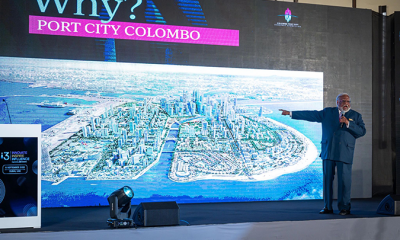Business
Technical Certificates of Completion for 64 out of 74 plots of Port City Colombo SEZ

Technical Certificates of Completion for 64 out of 74 plots of the Port City Colombo SEZ have been received by the Commission, a Colombo Port City Economic Commission semi-annual progress report for FY 2022 notes.
A press release by the Commssion said: ‘The Colombo Port City Economic Commission (the Commission), the Single Window Investment Facilitator authorised to assist investors, businesses, and residents in conducting their activities seamlessly and efficiently in Port City Colombo, is pleased to release its semi-annual progress report for FY 2022 from July to December 2022.
‘The Port City Colombo Special Economic Zone (SEZ) is designed to be a prestigious, strategically located city in the heart of South Asia, with sustainable high-quality public spaces and infrastructure, providing top-quality commercial, entertainment, medical, education and lifestyle. International destinations such as DIFC, DMCC, Labuan, Singapore, and Mauritius were studied for their regulatory frameworks, fiscal incentives, and operational efficiency to identify the most competitive processes and policies for Port City Colombo. The benchmarking study was done by global consultants such as Boston Consulting Group, PwC, KPMG, EY, Pinsent Masons, Zico Law, JLL, etc., for the SEZ’s thrust sectors, supported by market feedback on both fiscal and non-fiscal parameters.
‘Port City Colombo SEZ Regulations for the registration, licensing, authorisation and other approvals of Authorised Persons, were published by extraordinary gazette in September 2022, bearing number 2299/46. The SEZ’s Regulations for the registration and licensing of Authorised Person Fees, were also gazetted in September 2022, bearing number 2299/47. The registration of offshore company regulations were gazetted in the month of November 2022, bearing number 2306/54.
‘Agreements have been signed between the Commission and the Registrar General of Companies and Controller General of Immigration and Emigration in order to streamline services offered to Authorised Persons.
‘Sectoral Progress Highlights:
Banking – The Minister of Finance issued licences under the Colombo Port City Economic Commission Act to four (4) banks during the first half of 2022. The Commission has since received requests from three (3) more banks during 2022. Additionally, 10 Financial and Banking Regulations were also drafted under Sections 44 and Sections 45 of the Colombo Port City Economic Commission Act No. 11 of 2021 and are awaiting review with the Monetary Board of Sri Lanka.
Security – The Sri Lanka Police opened a Post on-site for visitor protection, with water access control and lifeguard services being handed to the Sri Lanka Navy. CCTV networks were also installed in public areas.
Social Infrastructure – In addition to an internationally-reputed hospital and school, the Commission has identified the need for a world-class university within Port City Colombo and modified the Master Plan accordingly.
Commercial Infrastructure – With the retail mall infrastructure complete, the commencement of the interior work has begun. The mall will showcase premium merchandise, with an array of cuisine options and entertainment, and is set to commence operations by Q2 of 2023.
Immigration and Visa Arrangements – In collaboration with the Department of Immigration and Emigration, the Commission has introduced three (3) new visa categories for Port City Colombo. These 3 visa categories are – the Investor visa for ten (10) years, the Employment visa for up to five (5) years, and the Resident visa for five (5) years. Port City Colombo visas allow supplementary benefits, such as visas for the spouse, kids, and other support staff members, which can be obtained under the primary visa applicant. The visa fee is USD 200 per year for each applicant. Visas are renewable as required and applicable only to Foreign Investors.
Master Plan Implementation – A planning committee consisting of key stakeholders was created to expedite the approval of building plans submitted under the Development Control Regulations (DCRs) for each plot of the Port City Colombo SEZ. The DCRs provide a clear framework for the development of buildings, land use, green spaces, utility networks, and sustainability measures, among other factors.
Preliminary designs for the Marina Development and Villa Project have been submitted by two investors, with several more plots in the final stages of discussion for lease.
Business
Why Sri Lanka’s new environmental penalties could redraw the Economics of Growth

For decades, environmental crime in Sri Lanka has been cheap.
Polluters paid fines that barely registered on balance sheets, violations dragged through courts and the real costs — poisoned waterways, degraded land, public health damage — were quietly transferred to the public. That arithmetic, long tolerated, is now being challenged by a proposed overhaul of the country’s environmental penalty regime.
At the centre of this shift is the Central Environmental Authority (CEA), which is seeking to modernise the National Environmental Act, raising penalties, tightening enforcement and reframing environmental compliance as an economic — not merely regulatory — issue.
“Environmental protection can no longer be treated as a peripheral concern. It is directly linked to national productivity, public health expenditure and investor confidence, CEA Director General Kapila Mahesh Rajapaksha told The Island Financial Review. “The revised penalty framework is intended to ensure that the cost of non-compliance is no longer cheaper than compliance itself.”
Under the existing law, many pollution-related offences attract fines so modest that they have functioned less as deterrents than as operating expenses. In economic terms, they created a perverse incentive: pollute first, litigate later, pay little — if at all.
The proposed amendments aim to reverse this logic. Draft provisions increase fines for air, water and noise pollution to levels running into hundreds of thousands — and potentially up to Rs. 1 million — per offence, with additional daily penalties for continuing violations. Some offences are also set to become cognisable, enabling faster enforcement action.
“This is about correcting a market failure, Rajapaksha said. “When environmental damage is not properly priced, the economy absorbs hidden losses — through healthcare costs, disaster mitigation, water treatment and loss of livelihoods.”
Those losses are not theoretical. Pollution-linked illnesses increase public healthcare spending. Industrial contamination damages agricultural output. Environmental degradation weakens tourism and raises disaster-response costs — all while eroding Sri Lanka’s natural capital.
Economists increasingly argue that weak environmental enforcement has acted as an implicit subsidy to polluting industries, distorting competition and discouraging investment in cleaner technologies.
The new penalty regime, by contrast, signals a shift towards cost internalisation — forcing businesses to account for environmental risk as part of their operating model.
The reforms arrive at a time when global capital is becoming more selective. Environmental, Social and Governance (ESG) benchmarks are now embedded in lending, insurance and trade access. Countries perceived as weak on enforcement face higher financing costs and shrinking market access.
“A transparent and credible environmental regulatory system actually reduces investment risk, Rajapaksha noted. “Serious investors want predictability — not regulatory arbitrage that collapses under public pressure or litigation.”
For Sri Lanka, the implications are significant. Stronger enforcement could help align the country with international supply-chain standards, particularly in manufacturing, agribusiness and tourism — sectors where environmental compliance increasingly determines competitiveness.
Business groups are expected to raise concerns about compliance costs, particularly for small and medium-scale enterprises. The CEA insists the objective is not to shut down industry but to shift behaviour.
“This is not an anti-growth agenda, Rajapaksha said. “It is about ensuring growth does not cannibalise the very resources it depends on.”
In the longer term, stricter penalties may stimulate demand for environmental services — monitoring, waste management, clean technology, compliance auditing — creating new economic activity and skilled employment.
Yet legislation alone will not suffice. Sri Lanka’s environmental laws have historically suffered from weak enforcement, delayed prosecutions and institutional bottlenecks. Without consistent application, higher penalties risk remaining symbolic.
The CEA says reforms will be accompanied by improved monitoring, digitalised approval systems and closer coordination with enforcement agencies.
By Ifham Nizam
Business
Milinda Moragoda meets with Gautam Adani

Milinda Moragoda, Founder of the Pathfinder Foundation, who was in New Delhi to participate at the 4th India-Japan Forum, met with Gautam Adani, Chairman of Adani Group.
Adani Group recently announced that they will invest US$75 billion in the energy transition over the next 5 years. They will also be investing $5 billion in Google’s AI data center in India.Milinda Moragoda,
Milinda Moragoda, was invited by India’s Ministry of External Affairs and the Ananta Centre to participate in the 4th India–Japan Forum, held recently in New Delhi. In his presentation, he proposed that India consider taking the lead in a post-disaster reconstruction and recovery initiative for Sri Lanka, with Japan serving as a strategic partner in this effort. The forum itself covered a broad range of issues related to India–Japan cooperation, including economic security, semiconductors, trade, nuclear power, digitalization, strategic minerals, and investment.
The India-Japan Forum provides a platform for Indian and Japanese leaders to shape the future of bilateral and strategic partnerships through deliberation and collaboration. The forum is convened by the Ministry of External Affairs, Government of India, and the Anantha Centre.
Business
HNB Assurance welcomes 2026 with strong momentum towards 10 in 5

HNB Assurance enters 2026 with renewed purpose and clear ambition as it moves into a defining phase of its 10 in 5 strategic journey. With the final leg toward achieving a 10% life insurance market share by 2026 now in focus, the company is gearing up for a year of transformation, innovation, and accelerated growth.
Closing 2025 on a strong note, HNB Assurance delivered outstanding results, continuously achieving growth above the industry average while strengthening its people, partnerships and brand. Industry awards, other achievements, and continued customer trust reflect the company’s strong performance and ongoing commitment to providing meaningful protection solutions for all Sri Lankans.
Commenting on the year ahead, Lasitha Wimalarathne, Executive Director / Chief Executive Officer of HNB Assurance, stated, “Guided by our 2026 theme, ‘Reimagine. Reinvent. Redefine.’, we are setting our sights beyond convention. Our aim is to reimagine what is possible for the life insurance industry, for our customers, and for the communities we serve, while laying a strong foundation for the next 25 years as a trusted life insurance partner in Sri Lanka. This year, we also celebrate 25 years of HNB Assurance, a milestone that is special in itself and a testament to the trust and support of our customers, partners and people. For us, success is not defined solely by financial performance. It is measured by the trust we earn, the promises we honor, the lives we protect, and the positive impact we create for all our stakeholders. Our ambition is clear, to be a top-tier life insurance company that sets benchmarks in customer experience, professionalism and people development.”
For HNB Assurance looking back at a year of progress and recognition, the collective efforts of the team have created a strong momentum for the year ahead.
“The progress we have made gives us strong confidence as we enter the final phase of our 10 in 5 journey. Being recognized as the Best Life Insurance Company at the Global Brand Awards 2025, receiving the National-level Silver Award for Local Market Reach and the Insurance Sector Gold Award at the National Business Excellence Awards, and being named Best Life Bancassurance Provider in Sri Lanka for the fifth consecutive year by the Global Banking and Finance Review, UK, reflect the consistency of our performance, the strength of our strategy, along with the passion, and commitment of our people.”
-

 News3 days ago
News3 days agoInterception of SL fishing craft by Seychelles: Trawler owners demand international investigation
-

 News3 days ago
News3 days agoBroad support emerges for Faiszer’s sweeping proposals on long- delayed divorce and personal law reforms
-

 News4 days ago
News4 days agoPrivate airline crew member nabbed with contraband gold
-

 News2 days ago
News2 days agoPrez seeks Harsha’s help to address CC’s concerns over appointment of AG
-

 News2 days ago
News2 days agoGovt. exploring possibility of converting EPF benefits into private sector pensions
-

 Features3 days ago
Features3 days agoEducational reforms under the NPP government
-

 News6 days ago
News6 days agoHealth Minister sends letter of demand for one billion rupees in damages
-

 Features4 days ago
Features4 days agoPharmaceuticals, deaths, and work ethics

























